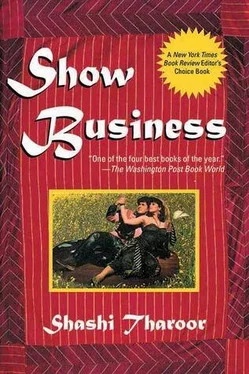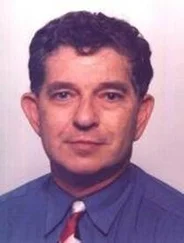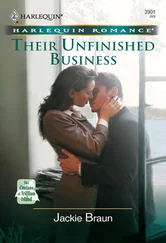“You know it’s not the same thing,” he said, visibly curbing his evident impatience. “Ashok, why won’t you do this?” No “Ashok bhai” here. I notice that the suffix always slips when he can’t summon even ritual respect for me.
I go on the offensive for once. “You know perfectly well why I won’t set myself up at Dad’s place. He never issued one word of support for me during the election — no endorsement, no campaign appearance, nothing. When I won, he couldn’t find it in his heart to congratulate me. Not even when I came home in triumph.”
“Ashok-bhai, you’re overreacting.” He’s trying.
“You know what he said? Within my hearing, to you? He said, ’Ashwin, well done.’ Just that. And then he turned to me, I was standing there looking at him, and the words just stuck in his throat.”
“Words, words — why do the words matter so much to you, Ashok-bhai? Everyone knows how he must have felt. Does everything have to be a line of dialogue from a script before you can see it?”
Despite myself, I decide to let that pass. “What would you say he felt at the time?”
“Pride, satisfaction, the obvious things.”
“Well, he didn’t exactly make them obvious.”
“Oh, Ashok-bhai, you’re being childish. What gesture did you make to him? Did you go and touch his feet and seek his blessings?”
I take a deep breath and expel it very slowly. “Ashwin,” I say calmly, “I don’t care to discuss this any further. And I am not coming to hold court in my father’s house. That’s final.” He eyes me evenly, and I realize with a pang that he doesn’t like me at all. It is a half-formed suspicion that has nestled at the base of my consciousness for a long time, like a coiled serpent waiting to spring. I recoil from its hiss now and turn away from my brother. “If these people want to sit and talk to me, send them here,” I say, waving my hand to take in the drab white walls of the hostel room.
“Are you serious?” Ashwin asks, his eyes narrowing.
“Every morning, from nine to ten,” I confirm expansively. “Oh — and don’t feel obliged to be here yourself, if you’d rather not.”
I want him to turn to me, to take me in his arms and say, “Brother, I know you need me, I know my resentment has hurt you, I am sorry, I shall always be by your side.” But of course he does not.
“If you think you can manage on your own,” he says stiffly, “I’ll be happy to direct them here and leave it all to you.” And this is the same Ashwin who has told me for weeks that I need a political mentor, a political handler, and a political secretary — none of which I have yet acquired.
I nod. “Do that,” I say. “I’ve asked too much of you already.”
He leaves, and I watch him go, noticing him really as if for the first time: the walk, the movement of his arms, the shape of his narrow hips under the kurta-pajamas. He is so much like me.
“Ashokji.” Dr. Sourav Gangoolie, party treasurer and Minister of State in the Prime Minister’s Secretariat, rises from a plush chair in his air-conditioned office and waves his unlit pipe in my general direction. “So glad you could come.”
His warmth is as unreal as the frigidity of the air in the room. I sit gingerly in the chair he offers me and find myself sinking with uneasy comfort into its leather-upholstered welcome. On the wall a lurid Husain print portrays Indira Gandhi as Durga, all-conquering goddess of South Block.
“Some tea?” Dr. Gangoolie — the honorific is of as uncertain provenance as the spelling of his surname, but that is what everyone calls him — blinks at me behind thick horn-rimmed glasses. He wears, unusually for a politician, safari suits rather than more indigenous garb and tries to conceal buck teeth behind a trimmed beard and a rarely lit pipe, whose function, it has long been rumored, is primarily to prompt him to keep his lips sealed. With his short hair, beaky nose, and prominent ears he looks like a subspecies of owl, but a more knowing and less corpulent variety than the genus Sponerwalla. Fittingly, Dr. Gangoolie has a reputation for both erudition and discretion, which has only increased with his appointment to the Prime Minister’s Secretariat while still holding his party post. Behind his desk is a framed caricature of Dr. Gangoolie himself by the cartoonist Kutty, but where smoke curls out of the pictorial pipe, the real one is, as far as I can make out, unlit.
“Oh — no, thank you. I’ll wait,” I reply. I expect I’ll get another cup when I’m with the PM, and few liquids are as undrinkable as government-issue tea.
Dr. Gangoolie seems somewhat put out by my reply, for he opens his mouth and closes it again on the mouthpiece of his pipe. I feel impelled to ease the strain. “As you know, I’ve been trying to see the Prime Minister for some time now,” I say defensively.
“Yes, yes.” He looks uncomfortable, like a producer reminded of a promise. “The PM has been really, so to say, busy. So many meetings, visitors, overseas trips, you know how it has been.”
“Yes, of course,” I reply graciously. “I can well imagine. But I am glad the summons has come at last.”
“Oh, dear.” The resemblance to an owl becomes even more pronounced as Dr. Gangoolie tilts his head sideways and examines me in dismay through his glasses. “I fear there has been, so to say, a misunderstanding.”
“There has?” Dr. Gangoolie’s habit of lapsing into a sibilant “so to say” is beginning to grate.
“I am afraid so.” Dr. Gangoolie takes his pipe out of his mouth and smiles ingratiatingly, but the eyes behind the glasses are stern. “You see, it is not the Prime Minister who wishes to see you today, but, so to say, me.”
“You?” I flush with embarrassment. “But my secretary said the Prime Minister’s office had called — I’m sorry,” I mutter, cursing Subramanyam for taking so long to get the hang of this place.
“That’s all right,” Dr. Gangoolie says in a tone that almost sounds cheerful. But he does not offer me another cup of tea. “How are you, so to say, getting on here in Delhi, Ashokji?”
“It’s a different world for me, Dr. Gangoolie,” I reply candidly. “And there’s still a lot I have to learn. But I do wish I could be of some greater use to the party and the government than adorning the back benches and casting the occasional parliamentary vote.”
“Indeed you can, Ashokji.” Dr. Gangoolie looks delighted at the turn of the conversation. “That is precisely why I have, so to say, called you here today. It is — uh — a rather delicate matter.”
“I’m all ears.” I sit up. This is the first time the powers-that-be have taken any interest in me.
“Of course, what I am about to say must not, so to say, go beyond these four walls.” He indicates them with a sweep of his pipe, as if to leave me in no doubt about which four walls he means.
“Of course.” I am at my professional best; my voice reflects a man who is firm, clear, dependable.
He looks suitably gratified. Then his expression changes. “How much did the party contribute to your election expenses, Ashokji?” he asks abruptly.
I am somewhat taken aback by the question. “I don’t really know,” I say tentatively. “My brother, Ashwin, handled that kind of thing.”
“But would you hazard, so to say, a guess, perhaps?”
“Oh, seven, eight lakhs?”
Dr. Gangoolie gets up, walks over to his desk, pulls a file out of a drawer, consults it. “Seventeen lakhs, three hundred and four rupees,” he says, slipping the file back and closing the drawer with the turn of a key, “and sixty-two paise.”
I raise my eyebrows, impressed.
“One of our higher subventions,” he says smugly, “but then it was, so to say, an important race. Some of our other first-time candidates got only eight-nine lakhs.”
Читать дальше












